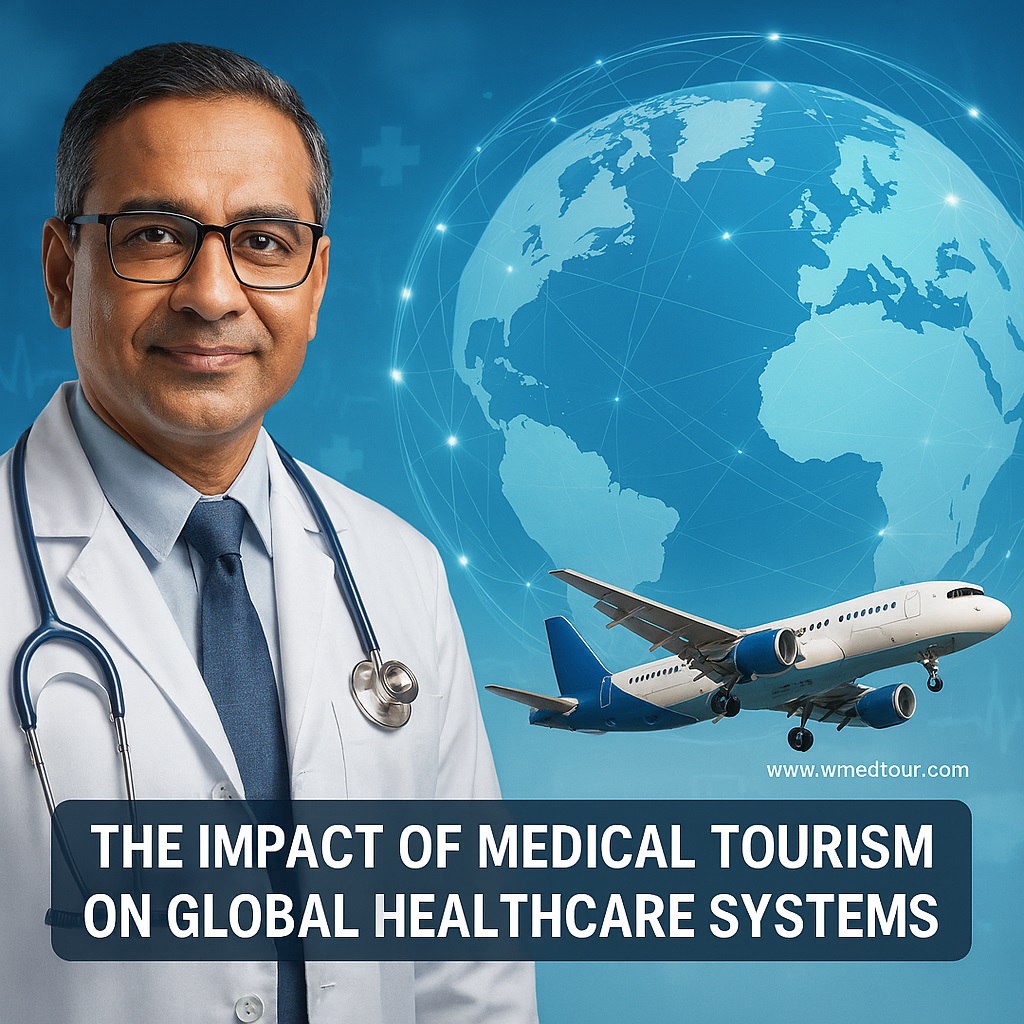The Impact of Medical Tourism: Navigating Global Healthcare
Published on September 5, 2025
Medical tourism is a phenomenon that’s fundamentally changing the landscape of healthcare worldwide. As more and more people seek high-quality, affordable treatments beyond their borders, this industry creates both remarkable opportunities and complex challenges. In this article, we’ll explore the multifaceted impact of medical tourism on global healthcare systems, from boosting economies to raising ethical questions about equity. Ultimately, we’ll help you understand this dynamic trend and how to navigate it for the best possible results.
Medical tourism is the practice of traveling to another country for medical, dental, or surgical care. While people have always traveled for healing, modern medical tourism is driven by distinct factors. For instance, the high cost of procedures, long wait times, and the lack of specific treatments at home are all major motivators. Consequently, countries with advanced medical facilities and lower costs have become popular destinations. Thailand, India, and Turkey are long-standing leaders, while emerging hubs like Iran, Brazil, and South Korea are rapidly gaining prominence.
How Medical Tourism Shapes Destination Economies
For destination countries, the benefits of medical tourism are often significant. The industry directly generates revenue, creates jobs, and stimulates infrastructure development. In fact, it’s a powerful economic driver that extends far beyond just hospitals and clinics. For example, hotels, transportation services, and local businesses all benefit from the influx of international patients and their companions. A study by ResearchGate suggests that the global market could exceed **$180 billion by 2025**, with a significant portion of this growth coming from developing nations.
Moreover, medical tourism encourages technological advancement and raises healthcare standards. To attract international patients, hospitals invest in cutting-edge equipment and adopt global accreditation standards like JCI (Joint Commission International). As a result, this investment often elevates the quality of care for both foreign patients and local residents. Therefore, the growth of medical tourism can lead to a ‘trickle-down’ effect, improving the entire healthcare ecosystem.
For more on this topic, consider reading the article: Global Healthcare Initiatives and Our Role
Challenges and Ethical Considerations
While the economic benefits are clear, medical tourism also presents a number of challenges. One of the primary concerns is the potential for **internal “brain drain.”** As private hospitals catering to tourists grow, they may attract highly skilled doctors and nurses from the public sector. This can lead to a two-tiered system where private, elite care is available for foreign patients, while local citizens face longer wait times and reduced access to quality services. In developing countries, this can deepen existing health inequities.
Furthermore, there are legal and ethical issues to consider. Patients traveling for care might encounter different legal protections, and seeking recourse for medical malpractice can be incredibly difficult. The World Health Organization (WHO) and other global bodies have raised concerns about patient safety and the lack of continuity of care once a patient returns home. This page from the WHO provides an overview of their perspective on medical tourism.
The Rise of Digital Health and Its Role
The medical tourism landscape is also evolving with the rise of technology. Telemedicine, AI diagnostics, and digital health platforms are making healthcare more accessible and transparent. With these tools, patients can have a virtual consultation with a specialist abroad before they travel. This not only streamlines the process but also helps in making a more informed decision. The integration of technology is a game-changer, and it’s something to look for when choosing a medical tourism provider. For more information, check out our page on Telemedicine.
Key Considerations for a Safe and Successful Trip
How to Plan Your Medical Tourism Trip
Planning a medical trip abroad requires careful preparation. Taking a few proactive steps ensures your safety and improves your experience. When you’re considering a medical trip, a great deal of research is your best friend. This includes validating a clinic’s credentials, understanding the surgeon’s experience, and reviewing patient testimonials. Importantly, always confirm all costs upfront, including the procedure, accommodation, and any potential follow-up care.
Step 1: Research and Verify. Look for internationally accredited hospitals and clinics. Look for certifications from organizations like JCI, which indicate a commitment to global standards of care. The JCI website is a valuable resource for finding accredited facilities.
Step 2: Consult with Experts. Use a reputable medical tourism facilitator to help with the logistics. A good facilitator, like wmedtour, can manage everything from medical records to travel arrangements. This simplifies the process and reduces stress.
Step 3: Plan for Post-Procedure Recovery. Ensure you understand the recovery timeline and what’s included in your package. Know if follow-up care is provided and how you will communicate with your medical team after you return home. The CDC offers useful guidelines for medical tourists, emphasizing post-travel health management.
A Comparison of Top Medical Tourism Destinations
Choosing the right destination is crucial. While each country has its unique strengths, a few stand out for their quality, affordability, and range of services. The following table compares some of the best destinations, highlighting key attributes.
| Destination | Cost Savings (vs. Western countries) | Specialties | Key Highlights |
|---|---|---|---|
| Iran | 60-80% | Cosmetic Surgery (Rhinoplasty), Fertility Treatments, Organ Transplants, Stem Cell Therapy | Highly skilled surgeons, advanced diagnostics, legal framework for transplants, high success rates. Patients from neighboring countries are a large market. |
| Thailand | 50-70% | Cosmetic Procedures, Dental Care, Wellness and Spa, Cardiac Surgery | World-class hospitality, luxurious recovery suites, JCI-accredited hospitals, seamless patient experience. |
| India | 70-80% | Complex Surgeries, Organ Transplants, Orthopedics, Cancer Treatment | Advanced medical infrastructure, highly qualified specialists, cost-effective care packages. |
Iran: A Leader in Medical Tourism
As you can see from our comparison table, Iran has emerged as a significant player in the medical tourism industry. The country’s growth is driven by a combination of exceptional expertise, particularly in cosmetic and reconstructive surgery, and highly competitive costs. Iranian surgeons are internationally recognized, and clinics in major cities like Tehran and Shiraz offer state-of-the-art facilities. Importantly, the country also excels in high-demand, high-complexity areas like fertility treatments and oncology, attracting patients from across the region and beyond.
The combination of high-quality care and remarkable affordability makes Iran an increasingly attractive choice. In fact, official projections from a 2019 study published in PubMed Central estimated that the country would attract **1.4 million medical tourists annually by 2025**. This speaks volumes about its rising reputation. If you’re considering a medical procedure abroad, Iran offers world-class care without the exorbitant price tag.
Explore your options in Iran with us: Why Choose Iran for Your Medical Travel?
The Future of Medical Tourism
The medical tourism industry is only expected to grow. Projections suggest the market will continue to expand at a rapid pace, fueled by technological advancements and the increasing demand for accessible healthcare. The future will likely involve more seamless, tech-enabled patient journeys, stronger collaborations between international providers, and an even greater focus on patient experience. The key will be to manage this growth responsibly to ensure that it benefits everyone involved, from the patients to the local communities in destination countries.
In conclusion, medical tourism is a powerful force, creating economic growth and access to specialized care, while also presenting challenges that must be thoughtfully addressed. By understanding its impact and carefully planning your journey, you can take full advantage of the opportunities it offers. For a truly professional and seamless medical tourism experience, we suggest visiting wmedtour.com for the best results.
Frequently Asked Questions (FAQ)
What is medical tourism?
Medical tourism is the practice of traveling to a foreign country to receive medical, dental, or surgical care. It’s often motivated by the need for more affordable procedures, shorter wait times, or access to specialized treatments not available in one’s home country.
How much can I save on medical procedures through medical tourism?
The amount of savings can be substantial, often ranging from 40% to 80% or more compared to costs in the United States or Western Europe. The savings depend on the destination, the type of procedure, and the specific clinic or hospital you choose.
Is medical tourism safe?
Medical tourism can be very safe if you do proper research and choose a reputable provider. Look for internationally accredited hospitals and experienced surgeons. Always be aware of the potential risks, such as travel-related complications and differences in standards of care.
Which countries are the most popular for medical tourism?
Popular destinations include Thailand, India, Turkey, Mexico, Brazil, South Korea, and Iran. Each country specializes in different procedures, from cosmetic surgery and dental care to complex treatments like organ transplants and orthopedics.
What are the main benefits for patients?
The primary benefits are cost savings, reduced or eliminated wait times, and access to advanced or specialized treatments. Many patients also combine their treatment with a vacation, making the recovery process more relaxing and enjoyable.
What is the role of a medical tourism facilitator?
A facilitator, such as wmedtour, acts as a guide. They help with everything from visa assistance and arranging flights to booking accommodations and coordinating appointments with doctors. They simplify the process and ensure a seamless experience for the patient.
How do I choose the right doctor?
Choosing the right doctor involves researching their credentials, experience, and patient reviews. Look for doctors who are board-certified and have extensive experience in the specific procedure you need. A good facilitator can also provide verified information and help you make an informed choice.
What types of procedures are popular for medical tourism?
The most common procedures are cosmetic surgeries (e.g., rhinoplasty, liposuction), dental work (e.g., implants, veneers), orthopedic surgeries (e.g., knee and hip replacements), and fertility treatments (e.g., IVF).
How has technology impacted the medical tourism industry?
Technology, particularly telemedicine and AI, has transformed the industry. It allows for remote consultations, second opinions, and streamlined patient management, making the process of seeking care abroad much more convenient and transparent.
What are the potential risks of medical tourism?
Risks include complications during travel, potential for infection from multi-drug resistant organisms, and difficulty with legal recourse in case of a negative outcome. It’s vital to research all potential risks and have a clear plan for post-operative care.
What are the ethical concerns surrounding medical tourism?
Ethical concerns often revolve around “brain drain,” where medical professionals are drawn from the public sector to work in private facilities for foreign patients. This can lead to a two-tiered system and exacerbate health inequities within a country.
Does travel insurance cover medical tourism?
Most standard travel insurance policies do not cover planned medical procedures. However, there are specialized medical travel insurance policies available that provide coverage for complications, emergency care, and travel interruptions.
What is the typical length of stay for a medical tourist?
The length of stay varies greatly depending on the procedure. A dental visit might only require a few days, while a complex surgery could require a stay of several weeks for initial recovery before returning home.
What is the best time of year to travel for a medical procedure?
The best time to travel depends on the destination’s climate and tourist season. It’s generally best to avoid peak tourist seasons to ensure better availability of flights and accommodations. You should also consider the local weather to ensure it’s conducive to your recovery.
How do I handle language barriers?
Most reputable medical tourism hospitals have multilingual staff. If you work with a facilitator, they will ensure you have an interpreter or a coordinator who speaks your language to make communication seamless.
Can I combine my medical trip with a vacation?
Yes, many people do. However, it’s crucial to follow your doctor’s instructions regarding pre- and post-operative activities. Strenuous activities, prolonged sun exposure, or air travel too soon after a procedure can be risky.
What documents do I need for medical travel?
You’ll need a valid passport, a medical visa (if required), your full medical history, and any necessary prescriptions. Your medical tourism facilitator can help you gather and prepare all the required documents.
How do I pay for my treatment abroad?
Payment options vary, but most facilities accept major credit cards, wire transfers, and cash. Many facilitators offer package deals that include a wide range of services, and you can often pay a single fee to cover everything.
What happens if there are complications after I return home?
This is a critical consideration. Before you leave, you should have a plan for follow-up care with a local doctor. The medical tourism provider should also have a clear communication channel for you to address any issues or questions that arise after your return.
Can medical tourism help with chronic disease management?
Yes, medical tourism can be a viable option for managing chronic conditions, particularly for patients seeking advanced therapies, second opinions, or long-term care plans that may not be available or affordable in their home country.
How does medical tourism benefit local communities?
Beyond the direct economic impact on the healthcare sector, medical tourism can boost local economies through spending on food, lodging, and entertainment. It can also lead to job creation for interpreters, guides, and hospitality workers.
What are the common procedures in Iran?
Iran is particularly renowned for cosmetic surgeries, especially rhinoplasty. It is also a key destination for fertility treatments, eye surgeries, and certain complex procedures like organ transplants due to its advanced medical capabilities and legal framework.
Are the hospitals in Iran accredited?
Yes, many hospitals in Iran that cater to international patients hold international accreditations and are equipped with modern technology, meeting high global standards of care. They are committed to providing quality services to ensure patient safety and satisfaction.
What is the cost of a nose job in Iran?
The cost of a rhinoplasty (nose job) in Iran is significantly lower than in many Western countries, often ranging from 60% to 80% less. This affordability, combined with the high skill of Iranian surgeons, makes it a top choice for this procedure.
Is post-operative care available?
Most reputable medical tourism providers and hospitals offer comprehensive post-operative care. This includes check-ups, follow-up consultations, and rehabilitation services to ensure a smooth and successful recovery.
Why do patients from neighboring countries travel to Iran for medical care?
Patients from neighboring countries like Iraq, Oman, and Azerbaijan travel to Iran due to its geographical proximity, cultural similarities, competitive pricing, and advanced medical expertise, which is often superior to what is available in their home countries.
Are the medical professionals in Iran well-trained?
Yes, many Iranian doctors and surgeons are highly trained, with many having received education and training in Europe and North America. The country’s medical universities are highly competitive, producing a large number of skilled professionals each year.
How can I be sure I am choosing a reliable provider?
To ensure you’re choosing a reliable provider, always check for international accreditations, read patient testimonials, and work with a trusted facilitator. A transparent provider will offer clear information about their services and the qualifications of their medical staff.
What are the challenges of medical tourism for patients?
Challenges can include unfamiliar legal systems, potential for complications, and a lack of support once the patient returns home. These can be mitigated by careful planning and selecting a comprehensive service provider like wmedtour.
What is the economic impact on destination countries?
Medical tourism can bring significant economic benefits, including increased revenue, job creation, and investment in healthcare infrastructure. It can also stimulate growth in related sectors like tourism and hospitality.




